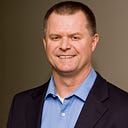How Struggling to Empower 100 Led to Empowering 1000's
God Often Uses Our Struggles and Failures to Prepare Us for Something Greater
As a pastor, I’ve always worked at following the Ephesians 4:11–12, ESV directive for church leaders to “equip the saints for the work of service.” God has important purposes and plans for every single person, and one of a leader’s primary jobs is to help people see what that purpose is and then accomplish it.
Stage 1
I remember reading in my first year of vocational ministry a book by David Yongi Cho, the pastor of the largest church in the world. In this book he taught how to build a church around small groups which meet in homes, apartments, schools, etc.
This seemed biblical to me (Acts 2:42–46) and made sense practically. When a church meets in small groups of 3–20, each person can be cared for, encouraged, trained, and empowered in their calling.
Every person matters to God and when we keep groups small, EVERYONE can receive ministry and learn to do their calling.
LIMITED SUCCESS
I used his model with a good success, but always felt there were some limitations to it. I just couldn’t figure out a better way.
His model, and the model many others use, has all groups doing the same thing, studying the same lesson, and following the same pattern.
I couldn’t figure out how to let the variety of gifts God gives to people be fully used in small groups. Especially the leaders.
Even though people have a variety of interests and gifts, this type of group has all leaders doing the same thing, the same way. Little room for creativity and variety.
I Kept Studying and Experimenting
For years, I kept studying the Bible, reading books, and trying various tweaks, but this model would only go so far in numerical and personal growth in people’s lives until it stalled….at least for me.
When I took the position of spiritual growth and small groups at a mega-church, I was still seeking God for the breakthrough idea that would keep small groups central to the life of the church while also empowering people to follow their unique gifts and passions.
One day, I bought a book by a pastor who was reaching thousands of people in his church using interest-based groups. People who were teachers could teach, those who were interested in serving others could lead serve groups.
Members who connected best with God in nature, could lead outdoors groups. People interested in social justice, prayer, street ministry, or doing business God’s way could ALL learn to lead small groups based on those interests.
By taking some simple steps, any leader could build a group around the things that most interested them and that they were most passionate about.
“AHA” Moment
I read a book by Daniel Goleman entitled Primal Leadership. Goleman said that though businesses spent hundreds of millions of dollars on training and education for employees, research showed very little of it stuck.
He then shared a powerful and should be obvious insight:
Adults only learn when they want to learn. An employer can force an employee to attend training. However, you can’t force them to learn information in seminars if they don’t want to learn it.
It clicked with me: not everyone has the same interests or the same learning style. Forcing all groups to do the same thing the same way would reach only a certain type of person.
If we want to reach and connect more people, we need a variety of groups with a variety of styles, but still based on biblical discipleship.
When I shared this idea with the senior pastor and staff, they gave me the go-ahead to build this type of group model.
Based on the struggles I had in building groups, I now added several new components for an expanded model of groups.
Big Breakthrough
Over a 5-year period, small groups in the church went from 80 groups with 800 members to 220 groups with 2200 members. 140 new people began leading groups who previously just attended on Sundays or thought they could never be a leader.
It was so exciting to see people affect the lives of others, doing things they loved to do.
People need very little outside motivation when they are doing things they care about and enjoy doing. With this model, it was relatively easy to train leaders in care and discipleship using their unique style and format.
The years of struggle laid a solid foundation for an expanded model of ministry.
God uses our seasons of struggle
So let me encourage you on your journey. God often uses seasons of struggle, even failure, to prepare us for something powerful. Struggle isn’t fun, but it is often necessary for what God has planned.
Just about every major figure in Scripture went through a season or seasons of waiting, struggle, or even injustice before God brought them to their place of fulfillment. Think of Abraham, Jacob, Joseph, Moses, Joshua, and David.
They all went through years of struggle, and unknowing preparation for what God was planning. Looking back, they would all say it was worth it.
It will be worth it for you too.
If you’re interested in learning more about knowing God and living His purposes for your life, take a look at www.TruVineMission.com.
